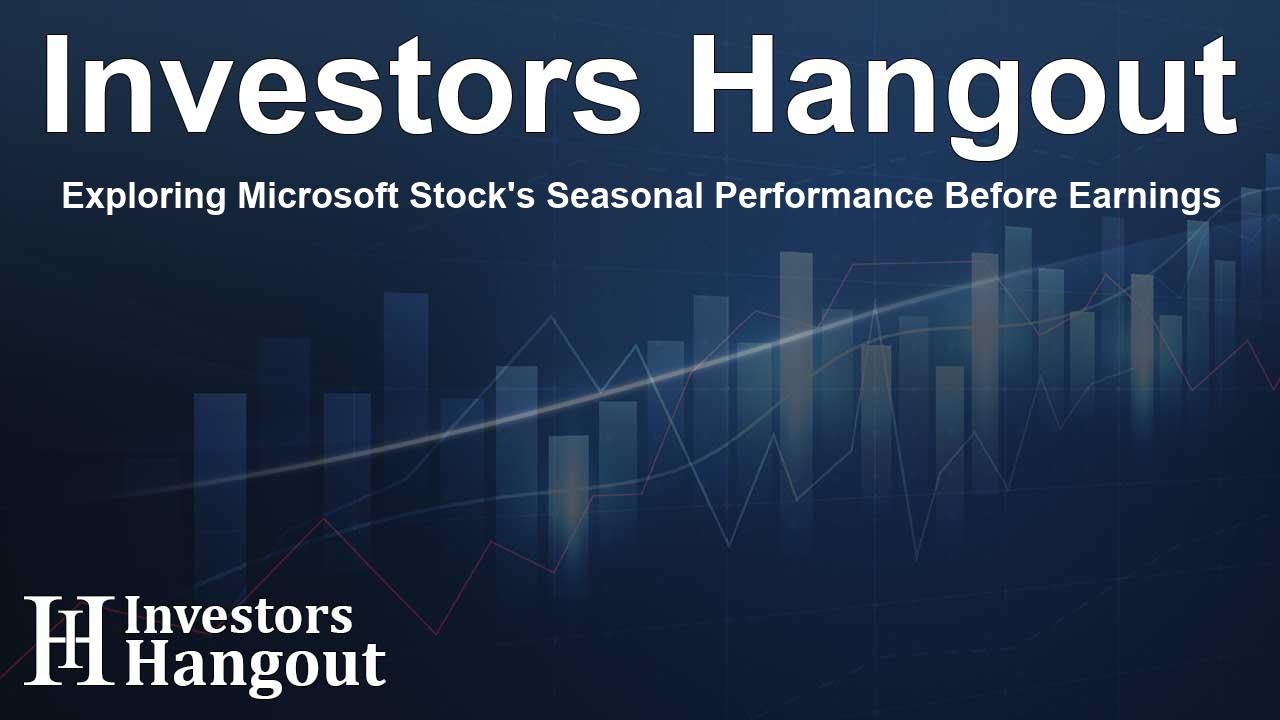Exploring Microsoft Stock's Seasonal Performance Before Earnings

Could Now Be the Right Time to Invest in Microsoft?
As Microsoft Corp. (NASDAQ: MSFT) prepares to unveil its fiscal first-quarter earnings soon, the question on the minds of many investors is whether now is an opportune moment to dive into this tech giant's stock. Data suggests a compelling case for this.
Microsoft's Persuasive Seasonal Patterns
Historically, the period between mid-October and early November has proven to be remarkably beneficial for Microsoft stock. An analysis shows that over the last quarter-century, the company has achieved gains in 19 out of those years, resulting in an impressive success rate of 76%.
During this timeframe, the average increase in stock value has registered around 6.5%. This impressive metric is coupled with notable consistent performance, even amid challenging market conditions.
Noteworthy Historical Performance
A standout moment for Microsoft occurred between October 16 and November 7 in the year 2000, when a staggering 40% spike in stock prices recorded a resurgence following the dot-com bubble burst. This solidifies the stock's credibility in this impactful earnings window.
In fact, over these 25 years, there have been eight instances where double-digit increases occurred, indicating a robust performance trend. The years 2000, 2001, 2002, 2007, 2009, 2014, 2015, and 2021 are particularly noteworthy for their standout performances. Moreover, from 2013 to 2017, Microsoft enjoyed five consecutive years of positive returns in this timeframe, underscoring an unbroken winning streak.
Managing Risks: The Down Years
Despite such remarkable success rates, losses have also occurred, albeit modestly. Out of the past 25 years, only six instances recorded negative returns, with most of the downturns being minimal. The years 2003 and 2008 were the exceptions, featuring losses of 8.5% and 10.8% respectively.
Understanding the Drivers Behind This Seasonality
The reasons behind Microsoft's historical performance during this period can be attributed to investor psychology and market dynamics. The timing of earnings announcements in late October often generates a positive investor outlook, igniting a rally that can set the trend for the tech sector as the year draws to a close.
Moreover, this period typically follows a sluggish September, which prompts many investors to 'buy the dip' as they actively realign their portfolios for the concluding quarter of the year.
Microsoft's 2025 Performance: A Strong Start
Entering into 2025, Microsoft has shown itself to be a strong performer, with its stock price rising 21% year-to-date as of mid-October. This performance exceeds its 25-year average return of 9.1% over the same timeframe.
Furthermore, the trend of gaining additional momentum after a robust year-end performance has historical precedence:
- 2021: The stock climbed 40% by mid-October, carrying a further 11.3% gain by November 8.
- 2023: Already on a 28% uptrend through mid-October, shares increased an additional 8.4% over the next three weeks.
Even Weak Market Conditions Yield Strong Returns
Interestingly, this impressive seasonal trend isn’t limited to bull market scenarios. Microsoft has demonstrated resilience even during unfavorable years:
- 2002: After a 26.5% YTD decline by mid-October, the stock rebounded with a 13.6% gain.
- 2005: Following a 6.9% downturn, it rallied back with a 9.5% boost.
- 2009: After dropping 17%, the stock surged back up by 11.7%.
- 2022: Despite being one of the worst economic years, Microsoft still managed to hold its ground during this earnings window.
The Bottom Line: A Timeline to Watch
As we approach the earnings announcement, Microsoft appears to be positioned well, historically benefiting from the mid-October to early November timeline. Investors who are banking on historical precedents may find themselves well-positioned for potential gains.
With promising figures already reported for 2025 and an established seasonal performance track record, Microsoft continues to be a solid prospect for those looking to invest.
Frequently Asked Questions
What makes October a historically strong month for Microsoft stock?
October aligns with Microsoft's earnings announcements, and historical data shows strong performance during this period, with a 76% win rate over the last 25 years.
How does investor sentiment affect Microsoft stock performance?
Investor optimism leading up to earnings often fuels a stock rally, particularly if the earnings set a positive tone for the tech sector moving forward.
Have there been any significant downturns for Microsoft in October?
While there have been downturns, they were generally minimal, with only a few instances of significant losses, typically recovering quickly afterward.
What was Microsoft's best performance in October historically?
Microsoft's best performance was in 2000 when shares jumped 40% due to correcting trends after the dot-com era.
What should investors consider when thinking of investing in Microsoft now?
Considering historical data, the current strong performance, and potential market trends, this October could be an ideal time to invest in Microsoft stock.
About The Author
Contact Olivia Taylor privately here. Or send an email with ATTN: Olivia Taylor as the subject to contact@investorshangout.com.
About Investors Hangout
Investors Hangout is a leading online stock forum for financial discussion and learning, offering a wide range of free tools and resources. It draws in traders of all levels, who exchange market knowledge, investigate trading tactics, and keep an eye on industry developments in real time. Featuring financial articles, stock message boards, quotes, charts, company profiles, and live news updates. Through cooperative learning and a wealth of informational resources, it helps users from novices creating their first portfolios to experts honing their techniques. Join Investors Hangout today: https://investorshangout.com/
The content of this article is based on factual, publicly available information and does not represent legal, financial, or investment advice. Investors Hangout does not offer financial advice, and the author is not a licensed financial advisor. Consult a qualified advisor before making any financial or investment decisions based on this article. This article should not be considered advice to purchase, sell, or hold any securities or other investments. If any of the material provided here is inaccurate, please contact us for corrections.
